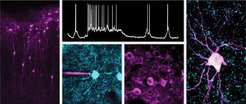Former Research Groups
Memory and Navigation Circuits Group - Hiroshi Ito
At the MPI for Brain Research: 2016 - 2025

Hiroshi Ito’s research at the Max Planck Institute for Brain Research focused on the neural circuits that support goal-directed navigation and planning based on internal cognitive maps. His team explored how animals, like rats, select spatial goals and simulate possible paths to reach them, even in the absence of direct sensory input. Using custom-designed navigation tasks, they recorded neural activity from hundreds of neurons across multiple brain regions with techniques like Neuropixels probes, optogenetics, and fiber photometry. The group focused not only on the hippocampus and cortical areas but also on subcortical structures like the thalamus and hypothalamus, examining how these regions coordinate to support long-range neural communication. Their work combined cutting-edge experimental methods with machine learning-based analysis to uncover how complex neural dynamics support planning and behavior.
Current affiliation and contact:
Dr. Hiroshi Ito
Associate Professor at Université de LausanneComputation in Neural Circuits Group - Julijana Gjorgjieva
At MPI for Brain Research: 2016 - 2022

The Computation in Neural Circuits group studies how neural circuit organization and computation emerge from the interaction of single neuron properties and synaptic plasticity during learning and development, and from efficient coding principles during evolution.
Efficient transmission of information across neural circuits requires an intricate balance between the intrinsic properties of single neurons and the synaptic connections between them. How are neurons and networks tuned to achieve this balance and enable the emergence of reliable computation? We are interested in two aspects of circuit organization: how it comes about from the interaction of single neuron properties and synaptic plasticity (as during learning and circuit development); and the organization principles that achieve it over the longer timescale of evolution.
Our work is based on computational and mathematical approaches to understand how activity, generated spontaneously in the circuit, or by the external environment, shapes network organization and dynamics. We study the interaction and the influence of a diversity of mechanisms, including synaptic plasticity, intrinsic cellular properties, sensory noise, and biophysical constraints, on the generation of adult function and computation.
Current affiliation and contact:
Prof. Dr. Julijana Gjorgijeva
Professor of Computational Neurosciences at Technische Universität MünchenTheory of Neural Dynamics Group - Tatjana Tchumatchenko
At MPI for Brain Research: 2013 - 2021

The Tchumatchenko lab focuses on the computational modeling and mathematical analysis of single neurons, neuronal populations and recurrent networks. We employ analytic tools and computer simulations to investigate how single neurons and populations respond to their synaptic inputs, and how they interact to give rise to functioning neuronal circuits. Areas of particular interest include the role of synaptic adaptation, information representation, response time scales and the temporal and cross neuronal correlations.
We employ a combination of analytical techniques that include linear and non-linear differential equations and their solutions via linear perturbation theory, stochastic integrals (e.g correlated Gaussian ensemble), Fokker Planck formalism, interacting stochastic processes. On the computational side we use numerical simulations and modern programming languages.
Current affiliation and contact:
Prof. Dr. Tatjana Tchumatchenko
Professor and deputy head of the Institute for Physiological ChemistryCo-affiliation:
Group leader at the Institute of Experimental Epileptology and Cognition Research
University of Bonn Medical Center
Venusberg-Campus 1
53127 Bonn
Neocortical Circuits Research Group - Johannes Letzkus
At MPI for Brain Research: 2013 - 2020

Brain functions such as perception, learning and emotion are generated by the activity patterns of neurons dynamically interacting within their circuits. Today, we have a detailed understanding of the computational capacity of single neurons. In contrast, the principles governing information processing once neurons are connected into circuits are still poorly understood. Research addressing this question has recently received a strong boost through the development of several new experimental approaches that allow high-resolution dissection of circuit function (in vivo 2-photon microscopy, transgenic mouse lines, viral vectors and optogenetics). We apply these techniques to investigate information processing in sensory areas of neocortex during perception and learning. Our research is guided by some key principles:
1. Circuits are best studied in their native environment, with inputs and outputs intact- i.e. we perform most experiments in vivo.
2. Circuits are composed of a rich diversity of neuron types with highly specialized function. We perform cell-type specific experiments to determine each neuron type’s contribution to circuit function.
3. Circuits are complex systems, making it difficult to extrapolate or generalize their function between different conditions. Thus, our experiments aim to model the brain function under investigation as closely as possible- mainly we study circuit activity during behavior.
Current affiliation and contact:



